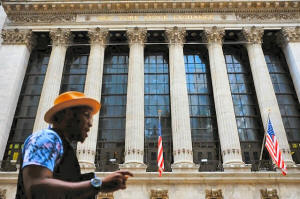|
After a long drought,
bear market funds attract buyers
 Send a link to a friend
Send a link to a friend
 [August 12, 2017]
By Trevor Hunnicutt [August 12, 2017]
By Trevor Hunnicutt
NEW YORK (Reuters) - Bearish stock
investors are slowly coming out of hibernation, as money has begun to
move into funds that aim to profit when markets dive.
U.S. mutual funds that attempt to profit in falling markets attracted
$413 million in new investments during the second quarter, the funds'
largest inflows since the height of 2013's "Taper Tantrum" selloff,
according to Thomson Reuters' Lipper research unit.
On Thursday, the S&P 500 experienced its first 1 percent-plus drop in 58
trading days, as the CBOE Volatility Index <.VIX> surged over 44
percent, noted Bespoke Investment Group.
The selling pressure in stocks follows a frustrating year-to-date for
bearish stock investors, given that the S&P was up 10.5 percent since
Dec. 31 as of Wednesday's close. As of Thursday's close, it is up 8.9
percent.

Markets this week were set in negative motion after the United States
and North Korea exchanged threats. President Donald Trump said Thursday
that his previous promise of "fire and fury" in response to any threats
from North Korea may have not gone far enough, vowing "trouble" for the
country if its actions do not change.
Brad Lamensdorf, portfolio manager for AdvisorShares Ranger Equity Bear
ETF <HDGE.P>, said he has seen demand for his fund partly driven by
"people that feel like it's time to hedge."
"They're pretty negative from a forward-looking view," he said. The fund
targets stocks with low earnings quality or potential accounting
problems; it has attracted $20 million this year.
The demand for these funds comes after a long drought, and remains a
mere drop in the bucket within the fund world. The funds posted outflows
in nine of the last 15 quarters, according to Lipper.
By contrast, domestic stock mutual funds and exchange-traded funds have
attracted $32 billion this year, including reinvested dividends,
according to the Investment Company Institute, a trade group.
Demand for international stocks and bonds has been even stronger as
investors tried to dial back exposure to U.S. stocks without the
expensive costs attached to hedging strategies.

The bear funds keep a "net short" exposure to stocks, aiming to rise
when markets fall. The cost of making that bet and the rising markets
have helped the category deliver a negative 13.5 percent return this
year, according to Lipper data through early August.
[to top of second column] |

A man walks by New York Stock Exchange in the financial district in
New York, U.S., August 10, 2017. REUTERS/Eduardo Munoz

"It's sort of become almost a cliche that this has been the most hated bull
market of all time, and I have a hard time buying into that," said Doug Ramsey,
chief investment officer of the Leuthold Group LLC, whose firm offers a bear
fund, the Grizzly Short Fund <GRZZX.O>.
The company's tactical funds recently reduced their net equity exposure, but he
said he could see another fresh top before entering a true bear market.
"We're only looking for a short-term setback here," he said.
Several major asset managers have expressed caution in recent days.
Bridgewater Associates LP's Ray Dalio wrote on Thursday that "prospective risks
are now rising and do not appear appropriately priced in."
Russ Koesterich at BlackRock Inc <BLK.N> said in a note this week that
tightening monetary policy in Europe and the United States could cause political
uncertainty to morph "from farce into tragedy" by shaking investor confidence.
Pacific Investment Management Company LLC portfolio managers Mihir Worah and
Geraldine Sundstrom said U.S. equities are "popular and crowded."
But some investors see the moderate U.S. equity flows and strengthening demand
for bearish funds as a contrarian sign that the markets may have more room to
run.

The nonprofit American Association of Individual Investors found that 36.1
percent of investors it surveyed expect the market to rise in the next six
months, 2 percentage points below that gauge's historical average. An
above-average 32.1 percent of investors were bearish.
"You don't see the kind of euphoria that normally presents at the end of the
cycle," said Leon Cooperman, chief executive of hedge fund Omega Advisors Inc.
"I don't see sentiment characteristic of a top."
(Reporting by Trevor Hunnicutt; Editing by Jennifer Ablan and Leslie Adler)
[© 2017 Thomson Reuters. All rights
reserved.] Copyright 2017 Reuters. All rights reserved. This material may not be published,
broadcast, rewritten or redistributed. |